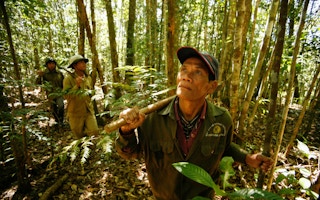The environmental sustainability of development projects cannot be guaranteed without effective safeguards. The problem is how to strengthen safeguards systems, a need that is becoming more urgent as we grapple with the impacts of climate change.
It’s an issue that multilateral development banks (MDBs) in particular must take concrete and bold steps to address.
Safeguards aim to mitigate the negative impact of projects on the environment and affected people. But they can be costly to implement for borrowing countries.
In a study of 60 World Bank projects, for instance, the average direct cost to borrowing country is $13.5 million. This leads some countries to consider alternative lenders with less requirements.
But the benefits from mitigated harm to the environment far outweigh the costs of implementing safeguards. Aside from unvalued environmental and social benefits, proper safeguards implementation can drive revenue such as tourism, as a 2016 ADB study on select projects shows.
Borrowing countries also have their own safeguards, but MDBs prefer their own. This is particularly the case in developing countries that face serious challenges to implementing national safeguards requirements. India and the People’s Republic of China, two of the world’s biggest carbon emitters, are still trying to address weak enforcement of existing environmental laws and regulations.
Whether to implement one or the other is a constant tug of war.
For MDBs, national safeguards have improved but projects should still abide by international safeguards, as noted during the panel discussion on safeguards at last month’s ADB Annual Meeting in Yokohama, Japan. CSOs, on the other hand, are more concerned about national safeguards in countries where governance is weak.
The solution therefore seems pretty easy: strike the right balance between the two. Strengthening national safeguards systems and aligning them with international safeguards requirements has always been the message of MDBs to borrowing countries. However, the devil is in the details.
Although MDBs do walk the talk in strengthening national safeguards via technical assistance and systematic approaches, they need to do more. One way to achieve this goal is through enhanced civil society organisation (CSO) involvement.
Hit two birds with one stone
MDBs acknowledge CSO involvement but often only in general terms, such as for consultation and checks-and-balances support to redress grievances from people affected by a particular project. CSOs thus still feel left out of the process.
CSOs are ready to play a more proactive role if they are given the formal space they need to serve as an independent third party to monitor the status of safeguards delivery in projects. CSOs can also become the conduit for regular public disclosure of progress (or lack of it).
Since monitoring safeguards delivery is a continuing process throughout the whole life cycle of a project, it makes sense to involve representatives of people affected by the project and who will strive to ensure it is environmentally sustainable.
This way, CSOs can take part of the burden away from MDB staff and project implementers (usually government agencies), who have additional responsibilities.
“
Proactive, not reactive, involvement of CSOs can help unlock the potential of civil society, and help make MDB projects as environmentally sustainable as they should be.
Of course, this is easier said than done. The degree of CSO participation across countries varies quite a bit, but that doesn’t mean that there is no value in formalising spaces and structures for civil society involvement in safeguards.
It’s similar to the problem with national vs. MDB safeguards. We need to both strengthen CSOs and boost their participation on national and MDB safeguards implementation.
After all, don’t all MDBs claim that they’re strengthening their collaboration with CSOs? Why not hit two birds with one stone?
Ad hoc CSO involvement is a waste of potential benefits for MDBs to doing business such as lowering of transaction cost by getting beneficiaries’ support to projects throughout the project cycle and avoiding potential damages that could only be identified through grassroots experience.
Imagine if, more than just MDB evaluation boards, you have an accredited party that is not invested in the project itself but is committed to community welfare by mandate. How many more risks could be mitigated? For sure, the transaction cost is higher when you have devastated environments and angry improperly resettled groups of people.
As MDBs join the call for Connecting People to Nature on this World Environment Day, they should also take extra steps to minimise harm to the environment, and deliver on their shared vision of eradicating poverty and promoting prosperity.
Proactive, not reactive, involvement of CSOs can help unlock the potential of civil society, and help make MDB projects as environmentally sustainable as they should be.









